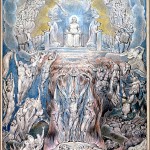What makes people believe the Message? What makes them keep believing even when it’s become a hurtful force in their lives?
I’m not a utilitarian or especially persuaded by rational-choice theory when it is applied to religion, so I don’t think that people need to “get something out of” their faith in tangible ways in order to believe it. Faith doesn’t need to make us happy or produce desirable outcomes in our lives for us to be persuaded that it’s true. For a long time, I believed in the Message to my own detriment. It made me miserable thinking that God had made me a weaker, lesser being and commanded me to spend my life in subjection to the other sex. But my pain didn’t necessarily lessen my conviction that the Message was true: I just thought, “This is how things are,” and kept believing… for years.
Despite my conviction that Message believers don’t believe because it makes them feel good (often, it doesn’t!), there are some definite “perks” to believing. One of these is expressed in the song One of the Few, a staple of my church’s worship services.
I am one of the few, yes I’m one of the few
And by faith in God’s Word I can claim it
Though the way may seem long and the opposition strong
For the Bride there’s a way provided
If I plan to go through, just to hope will not do
I must be firmly decided
To follow the Lord by obeying his Word
And believe that I’m one of the few
Another related song is One of Them, which describes the inability of outsiders to understand the “holy rollers” and the way believers are mocked for their exuberance. “I’m so glad that I can say I’m one of them” is the song’s repeated affirmation. Being part of a close-knit, tiny group of people who are chosen by God brings joy to believers. It makes something special, something chosen out of their otherwise ordinary lives.
In The Sixth Seal (March 23, 1963), Branham told an adapted Cinderella story about a wealthy young man falling in love with a servant girl and rescuing her from poverty. He told this story often as an allegory for the Bride of Christ. When the Rapture came, she would be swept into another dimension and enter her eternal reward for staying faithful to her heavenly Husband. But she was small and humble: the rest of the world would hardly notice her absence. My Message church taught that, unlike the catastrophic picture painted by the Left Behind book series, the real Rapture would be a “sudden, secret going away.” The Bride would be so small in number that it would hardly exceed the normal numbers of missing persons reports filed every year. The world would carry on without the believers, right up to the Tribulation.
Belief in the Message, then, gives believers a sense of staggering cosmic importance. If only two or three million (one of the estimates I heard growing up) would go in the Rapture out of a total global population of seven billion, how remarkable God’s grace in choosing you! Message believers would swear up and down (well, maybe if swearing were allowed) that they were celebrating this grace, not their own importance. But is such celebration right? Is it consistent with the other beliefs of the Message, such as the self-sacrificing love of Christ? Should not this jubilation turn immediately to sobriety and sorrow for the billions hurtling blindly into the dark? Where is the compassion for those other souls, equally precious in God’s eyes, who are condemned to death because they haven’t accepted the prophet’s message?
“I’m one in a million!” Message believers are wont to rejoice. “Thank God I’m one of the few! He chose me!” The sentiment is unavoidable, especially on Message websites.
I question, however, whether it’s particularly Christlike to rejoice in being spared the fate of the rest of the world. Branham once made much of the spirit of Christ in Moses, asking God to spare Israel and destroy him instead. In Discernment of Spirit (March 8, 1960), he preached:
Look at Moses when he come to a time that he displayed, all his life was the Spirit of Christ, for Christ was in him. Christ was in Moses by measure. Now, if we notice, he was borned in the time of persecution. The children was killed to try to get him, just exactly like they did Jesus. And we find out that when he come to a place that the children of Israel had disobeyed in such a way until God was angry with them, and He said to Moses, “Step aside and I’ll destroy the whole group of them, and I’ll take of you and raise up another generation.”
Moses threw hisself in the path of God’s judgment and said, “Take me before You take them.” In other words, “Before You can get them You’ll have to come over me.”
That’s exactly what Jesus Christ did. When God would’ve wiped the whole face of the earth off with these sinners, you and I, but Christ threw Hisself in the path. God could not do it; He couldn’t come over His own Son.
If this is the spirit of Christ according to Branham, shouldn’t believers be throwing themselves before God and begging him to take their lives rather than the lives of their “unsaved” family and friends? During my years in the Message, I’ve seen many “burdens” for unbelieving relatives laid before the altar for prayer. What I have not seen is anyone praying Moses’ prayer. What cruelty of heart, what dehumanization of others would it take for me to rejoice in the belief I am special, saved, and destined for glory when my friends, neighbors, and colleagues are bound for torment and death?
This is not simply a condemnation of hypocrisy in the Message. It is expected, even required, that one experience joy as a fruit of the Holy Spirit. Believers wearied by everyday troubles frequently pray, as David did, “restore to me the joy of my salvation.” The problem is not that individual Message believers are callous, cold or arrogant – such character flaws can be found anywhere. The problem is that the doctrine of exclusivity actively encourages people to rejoice in a “plan of salvation” that kills more than it saves. The problem is that the doctrine of the Rapture as taught by the Message tells believers that their first priority is to save their own skin (well, their own soul, anyway) and to hell (literally) with the rest. And the worst problem of all is that it teaches that God is content to save only a little fragmentary “elect” out of all his creations. It teaches that he deliberately breathed life into seven billion souls and steadfastly claims to love them, while erecting nearly insurmountable barriers over which they must climb to have a relationship with him: namely, the acceptance of a set of obscure and often cruel doctrines taught by an evangelical preacher from Kentucky more than fifty years ago. It teaches women that they must give up their lives, bodies, and dreams and commit themselves to servitude to be saved. It teaches men that they, too, must stifle their inquiring minds and subject themselves to a world already explained, in which reason is sin and interests are distractions. Message believers rejoice in the fact that God “hides” himself thus and reveals himself only to his elect. I condemn this belief.
A God who is worthy of worship does not create a world only to destroy it. A God who is “bound by his word” and “not willing that any should perish” should have exercised his omniscience and foreknowledge to avoid binding himself to words that kill those he claims to love. The God of the Message is irresponsible, cruel and capricious, and his “elect” are taught to revel in his favoritism. Like all petty lords, his preoccupation is with demonstrating his power, not his love or grace. It is not believers who are chiefly at fault: they are only striving to be like their father. It is William Branham and his false God who deserve to be scorned. They have built a world around power, hierarchy and favoritism. It’s time their feudal world crumbled and a real democracy took its place.
Two men went up into the church to pray; the one a Message believer, and the other an ordinary Christian. The Message believer stood and prayed thus with himself, God, I thank thee, that I am not as other men are, smokers, Democrats, or even as this denominational Christian. I listen to tapes every day, I believe in the words of the prophet, I am part of the Bride of Christ. And the other man, standing afar off, would not lift up so much as his eyes unto heaven, but smote upon his breast, saying, God be merciful to me a sinner. I tell you, this man went down to his house justified rather than the other: for every one that exalteth himself shall be abased; and he that humbleth himself shall be exalted. (Luke 18:10-14, modified.)












